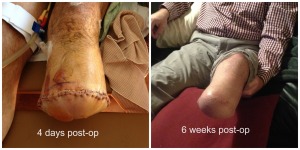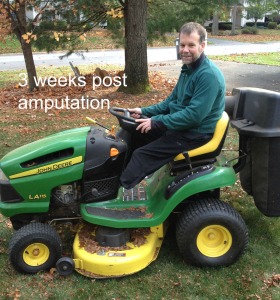 Pain Management – You will need to work with your doctor to make sure your pain is managed well before leaving the hospital.
Pain Management – You will need to work with your doctor to make sure your pain is managed well before leaving the hospital.
Ambulation – It is important that you work with physical therapy to ensure you will be able to be as independent as possible once you leave the hospital. This is where pre-surgery practice using crutches will have been very valuable. If you cannot safely walk with crutches or a walker you might end up in a rehab center. While a wheelchair is an option, it is not your best option as it will not give you independence and will weaken your body, making your physical recovery more difficult.
Wound Care – Getting the wound to heal properly is the primary concern. The wound can often be a difficult task to heal and take some time. Ask for wound care instructions before leaving the hospital. Your doctor will most likely not recommend starting the prosthetic fitting process until the wound is safely healed, which is about 6 to 8 weeks post-surgery.
Shrinker – The stump needs to shrink and shape properly for best results with the prosthetic. Therefore it is important to begin wearing a stump shrinker as soon as possible. The shrinker or properly-wrapped ace bandage needs to be worn at all times.
Preventing Muscle Contractures – This is more of a concern with a below-knee amputation as it is more likely to happen in the knee. In the first two weeks it is very important to keep the knee straight at all times. While sitting the stump must rest on something level so the knee remains straight, not bent. While lying in bed, keep the knee straight, and do not place a pillow under the knee.
The hip can also have muscle contractures so it is important to lie flat on your back and rotate to lying on your stomach periodically.
It is important to get the knee and hip moving as soon as possible.
 Regaining your independence and life routine -For me this was the key to my recovery. Being as independent as possible and returning to life was the best thing I could have done physically, mentally and to combat the phantom pain. This is once again where I am going to advocate for the immense value in learning to use a pair of crutches. I completely understand that there are physical and health conditions that would make using crutches impossible. However, most people do have the ability to learn to use crutches and train their body to tolerate them with determination and practice. As a single leg amputee, being able to ambulate well on crutches is the best thing you can do for yourself. For the rest of your life you will have the need for crutches, even after you are walking comfortably in a prosthesis. (Grabbing a pair of crutches for night trips to the bathroom is going to be much more convenient than putting on your leg or climbing in and out of a wheelchair.) I promise you, becoming comfortable on a proper pair of crutches will improve your life as an amputee tremendously.
Regaining your independence and life routine -For me this was the key to my recovery. Being as independent as possible and returning to life was the best thing I could have done physically, mentally and to combat the phantom pain. This is once again where I am going to advocate for the immense value in learning to use a pair of crutches. I completely understand that there are physical and health conditions that would make using crutches impossible. However, most people do have the ability to learn to use crutches and train their body to tolerate them with determination and practice. As a single leg amputee, being able to ambulate well on crutches is the best thing you can do for yourself. For the rest of your life you will have the need for crutches, even after you are walking comfortably in a prosthesis. (Grabbing a pair of crutches for night trips to the bathroom is going to be much more convenient than putting on your leg or climbing in and out of a wheelchair.) I promise you, becoming comfortable on a proper pair of crutches will improve your life as an amputee tremendously.
My philosophy – If it needed to be done and I could find an adaptable way to complete the task, I found it and did it. I amazed myself many times in what I was able to accomplish with one leg. The old saying applies well: “if there is a will, there is a way.” I began this mindset at 2 weeks post-op.
Emotionally – This might be the most difficult part of the recovery. Even if you go into surgery thinking you are prepared, you have no idea how you will react when seeing the leg gone. I was lucky it didn’t bother me and I was able to maintain a positive mood. That doesn’t mean learning to live without the leg was easy; it was a humbling and at times a difficult experience. I had times where I broke down and cried due to frustration in doing something as simple as retrieving my pants from the public restroom floor. (Keeping balance, doing your business, trust me – the pants end up on the floor.) There’s no question that life without a leg is not easy, but you will learn how to overcome it as long as you stay positive and put some work into it. “Attitude is Everything.”
Find help from family, friends, psychologists, and other amputees. With today’s social media, finding other amputees is easy. You found me! Friends and family are great, but only another amputee can truly understand what your life will be like. There are a ton of online resources and most hospitals and prosthetists can set you up with resources such as support groups and peer mentoring. Do a Google search for amputee support centers near you.
Help is only a message away! Send me a message by using my contact button, private message me through my Facebook page or Twitter. I would love to chat with you!

